
On the evening of March 7, members of the Minnesota Democratic-Farmer Labor party held precinct caucuses in neighborhoods across the state. These meetings, divided by electoral wards and subdivided into precincts, choose delegates to local party endorsement conventions and propose policy resolutions. Subsequent conventions, organized by state senate districts and by county, send delegates to a statewide convention that makes DFL endorsements in the primary election and winnows down the policy resolutions to write a party platform.
Thanks to friends who are DFL activists, I got a chance to see this form of neighborhood democracy in action. Ward 4, Precinct 2 and other many precincts met in Como Park High School, an echoing cinderblock maze of tiled hallways lined with yellow metal student lockers. At this local meeting, some 85 people crowed into a classroom equipped to seat about 50.
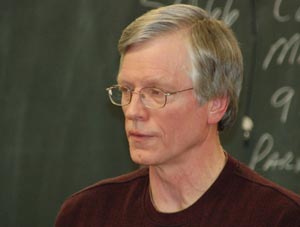
It was a gathering of old acquaintances, almost all appearing to be white and over 50, mostly eager to chat. Promptly at 7 pm, precinct chair Rick Winter brought the meeting to order -- and promptly was re-elected to continue in what seems to be considered a thankless chore. He leads a good meeting, an efficient combination of pushing the agenda forward with ensuring that all who wished could speak.
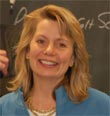
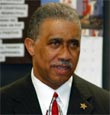
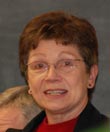
L to R: State Senator Ellen Anderson; Candidate for Ramsey County Sheriff Bill Finney; State Representative Alice Hausman
Various candidates for area offices wandered through, taking a couple of minutes to seek support and congratulate Ward 4, Precinct 2 on having the largest gathering among the many precincts in the High School building. They were repeatedly asked by caucus members wheter, if Ward 4, Precinct 2 was the largest, couldn't they be sited in the cafeteria next time? (On this evening, that space held several less well attended precinct meetings in different corners.)
Promptly at 7:30 pm, the precinct began selecting its delegates to the next level. This turned out to be easy: this precinct is entitled to 40 delegates -- only 36 volunteered so there was no need for an election. These delegates were not pledged to any candidates; they simply volunteered to attend the next level meeting and express candidate preferences at that meeting.
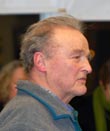 Then the assembly got down to discussing the policy provisions they cared about. First up was an older Eastern European immigrant who presented the resolution promoted by Peace in the Precincts, speaking with a strong accent. He was passionate:
Then the assembly got down to discussing the policy provisions they cared about. First up was an older Eastern European immigrant who presented the resolution promoted by Peace in the Precincts, speaking with a strong accent. He was passionate: There was no dissent on the peace plank. It passed unanimously.I came to this county in 1965 -- this is not the country I came to. Then America stood for freedom, for law. Now we invade countries for no reason and this bunch in Washington thinks they can do anything....(my paraphrase)
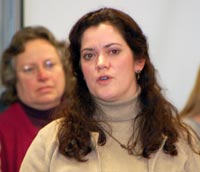
Several resolutions promoting health care for all and more funding for education also passed smoothly. Then a woman rose to suggest that DFL lawmakers should work for a state law to force pharmacies to fill all lawful prescriptions; pharmacists who might have scruples about some drug such as the morning after pill could personally abstain from filling it, but a licensed pharmacy would be barred from giving an employee's conscience preference over a patient's right receive a drug. There was considerable discussion: people were fearful that fundamentalist pharmacists might reduce access to birth control or HIV drugs, but they also were accustomed to wrestling with issues of personal conscience and therefore wanted to make sure that companies and employers bore the burden of the policy as opposed to individuals. The discussion seemed to clarify the issue and that policy resolution passed unanimously.
So, what's an outsider to make of the DFL caucus I saw? My DFL friends are pretty cynical about the process. They see a bunch of bleeding heart liberals (like themselves) who vote for feel good resolutions and can't even fill up a slate of delegates to carry their positions forward to the next level.
I came away rather more impressed. I organize in elections. I am impressed by any party system that can attract 85 people from a precinct to a meeting on a rainy March evening, not to cheer candidates, but to express their political hopes and ensure they have some representation at more influential levels of the endorsement process. There are not many corners of U.S. democracy where you get that kind of participation at the grassroots. Sure, these were the experienced and the comfortable, but they do show up and nearly all of them do some work in electoral battles in a highly contested state. That's terrific.
Verification, sweet precious verification of my story.
ReplyDeleteI received an e-mail from a retired Immigration Judge. It seems that the Assistant Chief Immigration Judge who looked the other way when Immigration Judges brough booze into a federal prison has been demoted.
Robert P. Owens, who oversaw the Eloy, Arizona Immigration Court that Immigration Judges Sean Keenan, Thomas O'Leary and John Davis brought booze into. A court located within the confines of a federal prison. Has been demoted.
Judges Keenan, O'Leary and Davis have still not been prosecuted for violating federal law, but the former Assistant Chief Immigration Judge who looked the other way has been demoted.
You can verify this by checking the EOIR website.
You could also e-mail the agency director (Kevin Rooney) and the Chief Immigration Judge (Michael Creppy) at (Kevin.Rooney@USDoJ.gov and Michael.Creppy@USDoJ.gov) and ask why the Immigration Judges that violated federal law have not been prosecuted and fired.
The comment above seems to me completely unrelated to the post to which it is attached.
ReplyDelete